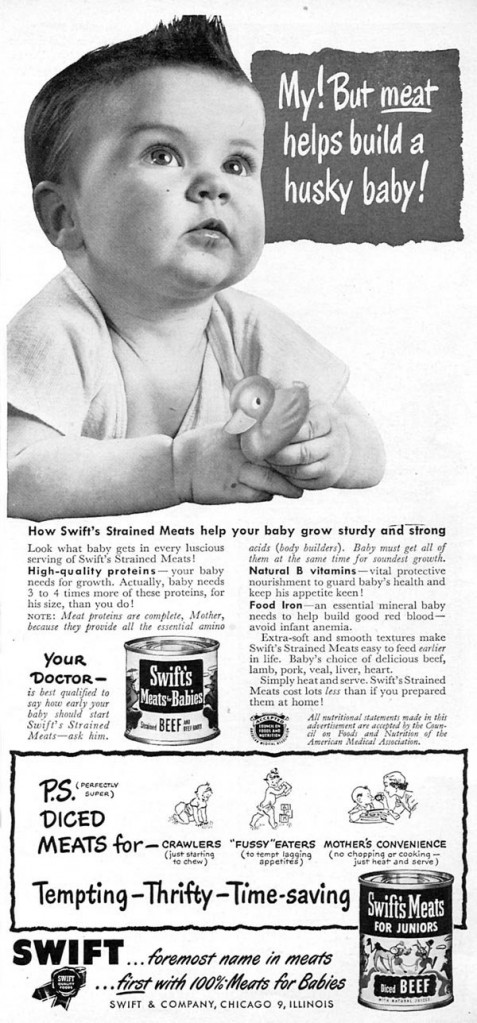Here’s a vintage ad for Swift canned meat products for babies:

(Found here.)
Are parents still encouraged to have “husky” babies? I have a feeling our changing ideas about body size and health have affected how we view babies as well (and I’ve heard of a couple of recent cases where insurance companies turned down infants for being too fat).
We’ve long seen meat associated with strength, particularly when it comes to men. And while the connection between meat and healthy growth is interesting–for instance, think of what we mean when we say someone is a “vegetable,” compared to the message here–what grabbed my attention was a line from the next-to-last paragraph of the ad text:
Baby’s choice of delicious beef, lamb, pork, veal, liver, heart.
It’s a great example of the social construction of what kinds of foods are appropriate and tasty. I highly suspect if Gerber’s put out a line of liver or heart baby food, it wouldn’t sell particularly well. I searched Gerber’s website and couldn’t find anything of the sort available (though they do still have veal with veal gravy). Most Americans simply don’t think of liver and heart as desirable foods any more, and would probably consider canned minced beef heart a more appropriate food for dogs than babies.
Of course, if you call liver paté or foie gras and make is sufficiently expensive, then it can become desirable again.

Comments 18
Brenda — October 26, 2009
some further commentary on the use of the word "vegetable"
http://disabledfeminists.com/2009/10/21/ableist-word-profile-vegetable/
Dragonclaws — October 26, 2009
Not exactly related, but it also references your doctor as "him". Changing gender roles would have modern ads simply go with "your doctor".
Chris — October 26, 2009
I thought the kid was big (95%-tile in both height and weight), not fat. The bigger question, of course, is why we would think it's remotely acceptable for insurance to be denied to at least 1-in-10 babies after you include both extremes.
Maria — October 26, 2009
i think the word "husky" has taken on a negative connotation these days. in the first half of the 20th century being "husky" meant healthy, well-fed, and strong, which was all a very positive thing- especially in the 1930's and 40's, when post-depression and during wwII good food was hard to find (ie health = wealth). it wasn't really until the 60's and 70's that "husky" became a bad thing, when fashion was dictating skinnier and skinnier profiles (thanks, twiggy) and "big kids" close were still labeled "husky".
Dr. Monkey — October 27, 2009
Mmmmmmmmm babies fattened up on canned meat.
Ariel — October 27, 2009
Interestingly enough, in Denmark (where I am currently working as an au pair) they eat a spread made out of liver constantly. I make the kids school lunches with it. Its like what peanut butter is in the US.
Tlönista — October 27, 2009
Is no one else disturbed that it's just "liver" and "heart"? What animals do they come from?!
On the other hand I grew up happily eating chopped liver (as a spread on bagels) and still don't know what it was from. Probably not pig, though.
Undefined — October 27, 2009
I'm rather skeptical of the suggestion that there's anything to the tendency to refer to persons in persistent vegetative states as 'vegetables'. It has nothing to do with being weak, nor to do with being 'dull as a turnip', but is rather to do with being non-sentient. If I'm not mistaken, the terminology is Aristotelian in origin: Aristotle divided the soul (by which he meant a kind of life-force or vital spirit) into various elements: the vegetable, animal, and rational. The vegetable element in the human soul was said to cause our bodies to grow and is otherwise reponsible for anything that is non-conscious and automatic in us. Aristotle's kind of a big deal in the history of Western thought, so the terminology stuck...
P — October 27, 2009
If "vegetable" is ableist and therefore offensive, then what do you make of "meathead?"
becky — October 29, 2009
I have a slightly newer (I'm guessing because it's a color ad) that not only features liver-and-bacon as one of the flavors (babies love salt, fat and nitrates!) but also says it has "10 times more protein than mother's milk!" and touts its suitability for babies as young as 3 WEEKS!
Hygrade Seed Company Says Vegetables Make You Tough and Strong » Sociological Images — November 7, 2009
[...] vintage examples of meat being connected to masculinity, see here and [...]
SELF DEVELOPMENT BLOG » Hygrade Seed Company Says Vegetables Make You Tough and Strong — November 8, 2009
[...] vintage examples of meat being connected to masculinity, see here and [...]
V for Vegan: easyVegan.info » Blog Archive » Intersectionality ‘Round the Interwebs, No. 11: Battered, Bruised & Consumed — November 9, 2009
[...] Gwen @ Sociological Images: Meat Builds Husky Babies! [...]
Guest Post, Rubies and Radishes: First Foods for Babies | Paleo Parents — April 10, 2013
[...] cultures introduce animal foods first, including American culture historically. Animal foods provide the most absorbable nutrients and babies produce the enzymes and stomach acid [...]